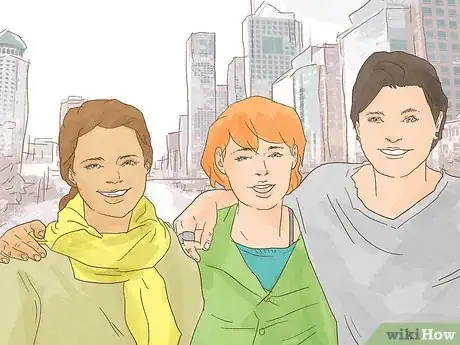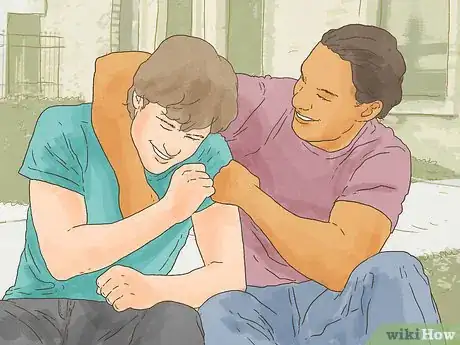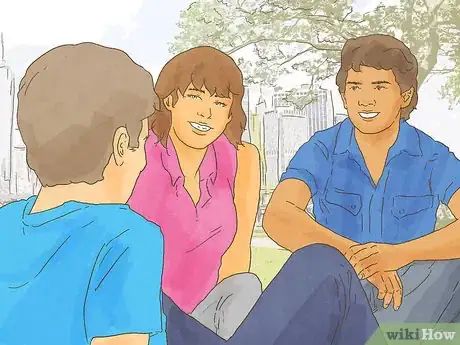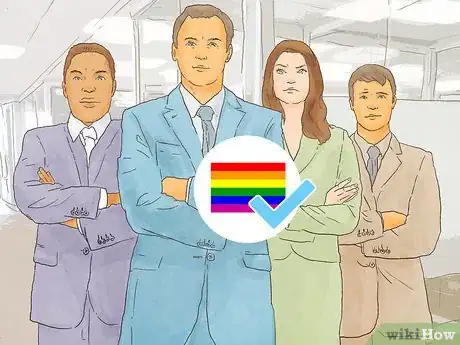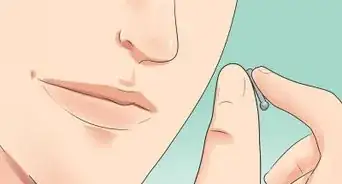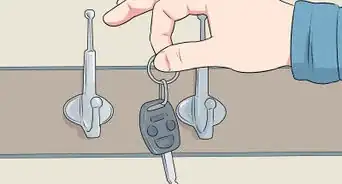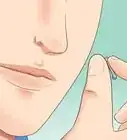This article was co-authored by Lily Zheng, MA. Lily Zheng is a Diversity, Equity, and Inclusion Consultant and Executive Coach who works with organizations around the world to build more inclusive and innovative workplaces for all. Lily is the author of Gender Ambiguity in the Workplace: Transgender and Gender-Diverse Discrimination (2018) and The Ethical Sellout: Maintaining Your Integrity in the Age of Compromise (2019). Lily earned her MA in Sociology from Stanford University.
There are 9 references cited in this article, which can be found at the bottom of the page.
This article has been viewed 30,811 times.
Do you feel like it's been difficult to find or keep good friends after coming out as lesbian, gay, bisexual, or transgender? It can be tough to feel different, but people are more open and accepting than ever before about differences in gender and sexual orientation.[1] You are not alone as you navigate your coming-out process. Find others in your community who identify as lesbian, gay, bisexual, or transgender (LGBT). Avoid the negative people in your life. Focus your efforts on being friends with those who support LGBT issues, as well as those who are simply supportive regardless of their orientation.
Steps
Finding Supportive Friends
-
1Connect with friends that have been supportive in the past. When coming out, reach out to the most supportive people in your life first. Talk with them about what you're feeling as you come out to friends and family. Recognize that some friends will react different compared to others. Some friends may require more time to process this change than others.[2]
- Find out which friends are more supportive and keep them in your life. Avoid withdrawing from your friends after coming out. Keep your relationships strong. Consider saying to your friends, "I hope that you can support me through this transition. It would mean a lot to me."
- Understand that some heterosexual friends may have questions about your coming out. Sometimes they simply don't know or understand what you're going through. If they are willing to genuinely listen, give them a chance. They may say or ask things like, "You don't seem gay," or "Are you sure you're gay?" or "How does it work on dates?"[3] Try to be patient and answer their questions as best you can.
- True friends, no matter where they are on the sexuality spectrum, will continue to stick by you when you're going through difficult times. Keep them in your life.
-
2Avoid negative people. Some friends or family may have difficulty with your sexual orientation. This may be due to the social environment they're in or their religious beliefs. If they make you feel less-than, worthless, or bad about yourself, avoid them.
- You don't have to be friends with people that you don't like.
- Understand that one person's negative comments don't necessarily indicate that everyone feels this way. Don't let one bully or one negative person define what you think of the people around you.
- Trust yourself and let go of negativity. Just know that some people cannot tolerate other people’s differences.
-
3Be open to new friendships. Recognize that some friends will come and go, regardless of you coming out or not. It's important to work towards friendships that make you happy. While it may feel difficult to find new friends, this process will help you to grow and change as you come out as LGBT.
- Be adventurous. Take a class. Join a social group or organization that interests you. See if there are activities that you like that seem to have many open-minded people of different backgrounds.[4]
- Find the right settings for friendships based on if you're better when it's one-on-one, a small group, or a big group.
- Cultivate friendships further with people in your classes or at work. With a bit of effort, acquaintances can become good friends.
-
4Be friends with people who don't care what your sexual orientation is. Friendships shouldn't be simply defined by your sexual orientation. Find people who are like-minded, kind, open, and honest. Having friends from diverse backgrounds regardless of their orientation will help you to see friendships from different perspectives.
- People that fit with your personality should matter more than what their orientation is.
- Don't feel like you're an outsider. It matters more that you feel accepted by your friends regardless of whether you're gay, straight, lesbian, transgender, or bisexual.
Reaching Out to Your Community
-
1Connect with the LGBT community in your area. Find out if there are social groups or community centers in your area that focus on LGBT issues. No matter your background or sexual identity, being in a space where you feel accepted for your sexuality is important and meaningful.[5]
- Talk with your school counselor at your high school to see if there may be youth groups for students who identify as LGBT. Find groups that feel welcoming for you.
- If you're in college, find out if there are student groups or activity centers where LGBT students go. Consider starting your own youth group for other LGBT students. Find out what your school's policies are, or what the environment is like for LGBT students at your school.
- Find out if there are community centers in your city that focus on LGBT issues. Search for centers in your state or city through CenterLink: http://www.lgbtcenters.org/
-
2Find support groups for people who come out. Coming out can be a stressful experience. Even after coming out, you may feel isolated or depressed. There are counseling centers that may offer support groups for youth or adults that have come out as gay, lesbian, bisexual or transgender. Consider joining a support group in your area.[6]
- Support groups can be healing experiences. They can help you feel less alone. They can also help you learn to communicate about your coming-out process.
- You may find people who are facing similar challenges of making friends. In this way, you can see what others are facing.
- Some support groups are offered at low or no-cost. Reach out to a counseling center that specializes in LGBT issues and see what they may have to offer.
-
3Be an advocate. Be involved in bringing inclusion rather than exclusion to your community. There are many social justice causes out there that support gay rights, women's rights, and human rights. Stand up for your rights and the rights of others. This can be done in-person or online. It can be through simple acts in your daily life or by joining a larger political movement.
- Support small businesses that advertise as gay-friendly and strive to make others feel included.
- Volunteer your time, money, or talents to others that are facing discrimination or prejudice. The act of helping others may also help you to make more friends. Learn about how you can contribute to organizations such as GLAAD: http://www.glaad.org/getinvolved/volunteer
- Be politically engaged. Pay attention to social activism in your community. Find political activist groups depending on your interests: http://www.startguide.org/orgs/orgs06.html
-
4Seek online support from others who identify as LGBT. If you live in an isolated area or a place that's anti-gay, it may feel difficult to make or keep friends. There are many resources online to help you through this transition, and to help you feel more included.
- Join an online message board or forum to discuss your interests with other people who are LGBT.
- Connect through LGBT social networking sites. Sometimes it may be easier to discuss what you're feeling with others who aren't in your neighborhood.
- Find help if you're feeling like you need to talk. Talk with a peer who's been through what you're going through. Connect with the GLBT National Help Center online, by phone, or through chat: http://www.glbthotline.org/
Being Yourself
-
1Be patient in the coming out process. It can be difficult to both tell someone about your orientation as well as worry about what will happen afterwards. Many people who identify as LGBT may know their identity as a teenager but wait years later to tell others that they're gay. It's okay to take things at your own pace. Allow others to find their pace with this information too.[7]
- Many people who identify LGBT feel more socially accepted than in years past. But keep in mind what feels right for you and your situation.
- Understand that what you say or when you say it is your choice. But sometimes, the timing matters. If someone receives serious news, it may take time to process. Try to be patient with those you care about.
-
2Don't give up on yourself. If you constantly try to hide who you are, you're going to have a hard time connecting with others. After possibly years of being closeted, it may feel harder to be truthful about your orientation rather than to continue putting on an act. [8]
- Believe that it will get better. Because it can get better.
- See this time as a way to be creative. Use your talents and skills to share with others who you are and what you're feeling. By being open, you may make more friends and feel less alone. Rather than feeling down, feel inspired to make change.
- To gain some perspective, try journaling about how life was before you came out and how it is now.
-
3Take pride and be confident in who you are. History has shown that being different often leads to discrimination and struggle. But in standing up for yourself and your values, history can change. Take pride in your identity even if it's not so easily accepted. Be confident that you have the same rights as anyone else.[9]
- By being true to yourself, others will admire that. Regardless of whether your friends are gay or straight, being confident in who you are is a strong and admirable quality.
- While you don't need to be shouting who you are on the rooftops, being comfortable in your own skin is important to making friends and loving yourself.
- Make sure to be patient with yourself and your friends as you go through these changes regarding your identity.
Expert Q&A
-
QuestionShould I come out at work?
 Lily Zheng, MALily Zheng is a Diversity, Equity, and Inclusion Consultant and Executive Coach who works with organizations around the world to build more inclusive and innovative workplaces for all. Lily is the author of Gender Ambiguity in the Workplace: Transgender and Gender-Diverse Discrimination (2018) and The Ethical Sellout: Maintaining Your Integrity in the Age of Compromise (2019). Lily earned her MA in Sociology from Stanford University.
Lily Zheng, MALily Zheng is a Diversity, Equity, and Inclusion Consultant and Executive Coach who works with organizations around the world to build more inclusive and innovative workplaces for all. Lily is the author of Gender Ambiguity in the Workplace: Transgender and Gender-Diverse Discrimination (2018) and The Ethical Sellout: Maintaining Your Integrity in the Age of Compromise (2019). Lily earned her MA in Sociology from Stanford University.
Diversity, Equity & Inclusion Consultant It depends on what feels right for you. Take your time to get comfortable with your coworkers. Open up gradually in your workplace to make friends with your coworkers. In the workplace, bring up topics of gender identity, gender expression, or transgender issues to learn about others' opinions. Then, engage with people who seem supportive.
It depends on what feels right for you. Take your time to get comfortable with your coworkers. Open up gradually in your workplace to make friends with your coworkers. In the workplace, bring up topics of gender identity, gender expression, or transgender issues to learn about others' opinions. Then, engage with people who seem supportive. -
QuestionWhere can I find people who understands being transgender?
 Lily Zheng, MALily Zheng is a Diversity, Equity, and Inclusion Consultant and Executive Coach who works with organizations around the world to build more inclusive and innovative workplaces for all. Lily is the author of Gender Ambiguity in the Workplace: Transgender and Gender-Diverse Discrimination (2018) and The Ethical Sellout: Maintaining Your Integrity in the Age of Compromise (2019). Lily earned her MA in Sociology from Stanford University.
Lily Zheng, MALily Zheng is a Diversity, Equity, and Inclusion Consultant and Executive Coach who works with organizations around the world to build more inclusive and innovative workplaces for all. Lily is the author of Gender Ambiguity in the Workplace: Transgender and Gender-Diverse Discrimination (2018) and The Ethical Sellout: Maintaining Your Integrity in the Age of Compromise (2019). Lily earned her MA in Sociology from Stanford University.
Diversity, Equity & Inclusion Consultant Look for meetups, social organizations, clubs, and businesses in your area that are LGBTQ+ friendly. Then, seek out communities of other transgender people and supportive allies in your local area or online. Community centers can be great places to start if they exist in your area.
Look for meetups, social organizations, clubs, and businesses in your area that are LGBTQ+ friendly. Then, seek out communities of other transgender people and supportive allies in your local area or online. Community centers can be great places to start if they exist in your area. -
QuestionMy friend told me I could change the fact that I'm a lesbian. What should I do? Unfriend her? How should I not let it get to me?
 Community AnswerStand up for yourself. Tell her that you can't change it, and even if you could, you wouldn't, because there's nothing wrong with it. Then tell her that if she can't accept you for who you are, you no longer want to be friends. Then find better friends. Plenty of people will love and accept you just as you are. There is no secret to not letting it get to you, just remember you can't force people to be less judgmental.
Community AnswerStand up for yourself. Tell her that you can't change it, and even if you could, you wouldn't, because there's nothing wrong with it. Then tell her that if she can't accept you for who you are, you no longer want to be friends. Then find better friends. Plenty of people will love and accept you just as you are. There is no secret to not letting it get to you, just remember you can't force people to be less judgmental.
Warnings
- If you feel unsafe with people at school or work, keep your distance. Seek help from people you trust if there is bullying or discrimination involved. Consider limiting your interactions with people who are not supportive of who you are and your orientation.⧼thumbs_response⧽
References
- ↑ https://www.theguardian.com/commentisfree/2016/mar/16/lgbt-people-are-more-accepted-than-ever-but-we-need-self-acceptance-too
- ↑ https://www.washington.edu/counseling/resources/resources-for-students/thinking-of-coming-out/
- ↑ http://www.teenvogue.com/story/things-you-shouldnt-say-to-gay-people
- ↑ http://www.apartmenttherapy.com/10-tried-true-tips-how-to-make-new-friends-in-a-new-city-187285
- ↑ http://www.healthyplace.com/gender/glbt-mental-health/gay-support-where-to-find-lgbt-help-and-support-groups/
- ↑ http://www.gendersanity.com/find_a_support_group.html
- ↑ http://www.pewsocialtrends.org/2013/06/13/a-survey-of-lgbt-americans/
- ↑ http://www.itgetsbetter.org/pages/about-it-gets-better-project/
- ↑ http://www.apa.org/pi/lgbt/resources/history.aspx
About this article
To make friends after coming out, try joining an LGBT group at your school or hanging out at your city's LGBT community center, where you can meet people that are open and accepting. If you live in a small town or somewhere that's anti-gay, try connecting with other LGBT people online through forums or social media. You might even be able to turn to old friends who have been accepting and supportive of you in the past. To learn how to be confident and take pride in who you are after coming out, scroll down!


